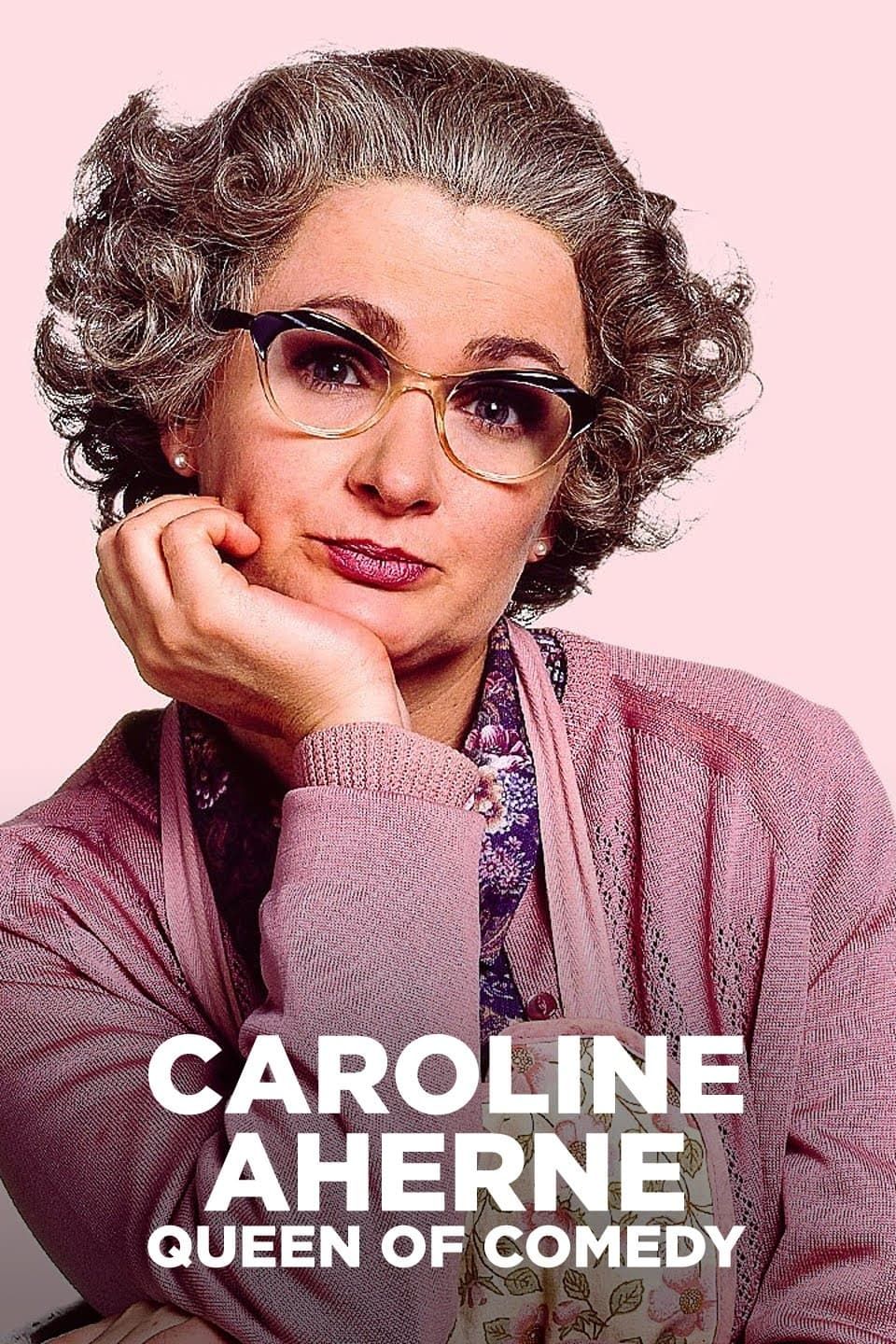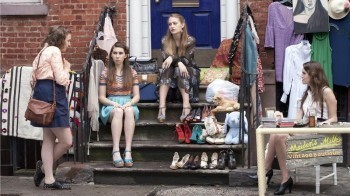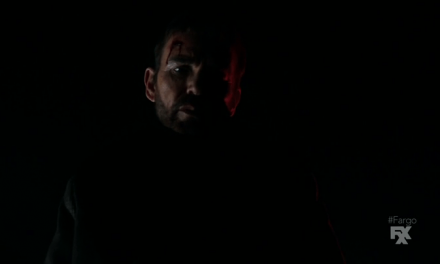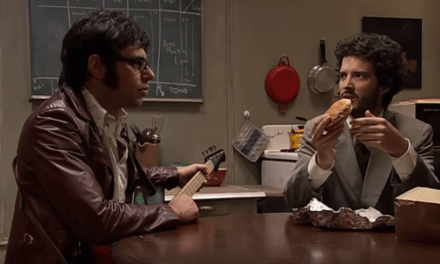For my family, Christmas means television. As far as I know, we have never owned Monopoly, and the idea of playing charades is quite frankly laughable. The Royle Family Christmas specials were a staple of our Christmas TV schedule for many years. Created by Caroline Aherne and Craig Cash, The Royle Family (BBC, 1999-2012) was a representation of ordinary working-class life, a family that clearly loved each other but didn’t always like each other and expressed their affection through taking the piss out of each other. This Christmas, the BBC aired Queen of Comedy, a documentary on Aherne who died in 2016. In this blog, I will reflect on the documentary, the enduring legacy of Aherne’s work, and the intersection of class and gender that is crucial to her persona/televisual output. Caroline Aherne: Queen of Comedy (BBC, 2023) was broadcast on BBC Two on Christmas Day. An Arena documentary, it was produced and directed by Claire Whalley and Hannah Lowes. It outlined Aherne’s professional career, as well as the impact that fame had on her personal life, featuring interviews from friends and collaborators, including Craig Cash, with whom she wrote The Royle Family, Steve Coogan, Lemn Sissay, as well as fellow Royle Family cast members Ricky Tomlinson and Sue Johnston. Alongside this, the documentary features contributions from friends and family who give an insight into Caroline’s personal life.
The position of working-class women within television has historically been understudied (Minor, 2023), whilst, as Hesmondhalgh (2017) argues, working-class representations are often misrepresentative, in part because of a lack of representation of working-class people within the industry. As Minor (2023) contends, this is further compounded for Northern working-class women who are often configured as masculine. Though “the BBC has a history of popular and critical successes with sitcoms focusing on white working-class femininities”, the working-classness of women writers such as Sophie Willan is often obscured in critical response to their work, with the focus solely on gender instead (Minor, 2023, p.141). Minor (2023) further suggests that critics discussed Willan’s sitcom Alma’s Not Normal, which is heavily concerned with class and situated within a specific working-class context, alongside Back to Life (BBC, 2019-2021) and This Way Up (Channel 4, 2019), both of which focus on middle-class women. The homogeneous way critics write about women’s comedy further makes the class discussions of work such as Willan’s invisible.
In contrast, Caroline Aherne: Queen of Comedy focuses heavily on Aherne’s working-classness, but there is comparatively little discussion of her gender. Although contributor Lemn Sissay notes that “the industry was very male. She was the only woman in the company of wolves”, this is reflected in the documentary itself. Whilst Aherne’s female friends provide insight into her personality, early career and personal life, the only women from within comedy who are featured are Carmel Morgan, a writer who first knew Aherne when she was a press officer and tasked with looking out for her, and Sue Johnston, who played Barbara Royle in The Royle Family.
Aherne’s working-classness is referenced heavily as inspiration for her humour. For example, the co-writer on The Royle Family describes her as “just a normal Wythenshawe girl at heart”, whilst film footage of 1970s Wythenshawe provides a visual representation of working-class life. Furthermore, Steve Coogan describes Aherne’s working-classness as “a little superpower that being from more privileged backgrounds you did not have”. Funniness is perceived as being positively associated with being working-class, emphasised by Aherne’s assertion that “you know how people are funny, aren’t they’” and Craig Cash’s statement that people from Wythenshawe are “full of character”. This can be contrasted against middle-class representations of working-class life, which scholars such as Hesmondhalgh (2017) and Skeggs (2005) have argued often present working-class people as exaggerated caricatures. Indeed, in the years after The Royle Family, representations of working-class people were more likely than not mediated through portrayals of the “chav”, such as Vicky Pollard in Little Britain and Lauren Cooper in The Catherine Tate Show. Lockyer (2010, p.128) suggests that “there is ample evidence to suggest that Vicky Pollard’s character reinforces the class-based contempt of chavs evident elsewhere in popular culture”.
Aherne’s work in/on both The Mrs Merton Show and The Royle Family demonstrates an authenticity that also does not romanticise working-class life. For example, Queen of Comedy recounts the time Aherne had Bernard Manning, a notoriously racist comedian, on The Mrs Merton Show, using the mock talk show as an opportunity to challenge his beliefs. Indeed, if The Royle Family provides a rejoinder to this stigmatised representation, this is not because the characters are without flaws. Patriarch Jim is lazy, often uncouth and slobbish; daughter Denise (played by Aherne) is similarly lazy, a terrible cook and selfish, whilst her husband Dave is often presented as dim. However, in contrast to comedy by middle-class writers that often stigmatise working-class people, The Royle Family is fundamentally about a loving family and is often tender as well as funny, as can be seen especially in the Christmas episodes ‘Christmas with the Royle Family’ (1999) and ‘The Queen of Sheba’ (2006). Furthermore, Skeggs (2005, p.975) argues that “The Royle Family TV programme presents a sustained attack on middle-class pretensions”, whilst Wickham (2017) notes that the show focused on class whilst at the same time moving away from sitcom conventions such as a laugh track and studio audience.
However, despite Aherne’s clearly important legacy, the documentary also comments on the negative way the press perceived her and how her position as a working-class woman influenced this. In an interview with Michael Parkinson that provides much of the narration of the documentary, Aherne recalls being described as “like the female Gazza”, referring to footballer Paul Gascoigne, who was famous in the nineties as much for his heavy drinking as for his talent on the pitch. Indeed, many of the contributors to the documentary note that Aherne was subject to press intrusion and that her drinking and romantic life were under particular scrutiny. Skeggs (2005) refers to how white working-class women are deemed excessive, and press coverage of the time certainly reinforces this.
Caroline Aherne: Queen of Comedy is a timely reminder of Aherne’s legacy, whilst the Caroline Aherne Bursary has continued her legacy by supporting female comedians such as Sophie Willan, Amy Gledhill and Kiri Pritchard McLean. While Queen of Comedy successfully discusses Aherne’s legacy as a working-class writer, there is a notable lack of representation of other female comedians in the documentary. Whether this is representative of the lack of women in the industry in the nineties or not, it highlights how female comedians are still often viewed as the exception within a male-dominated world.
Claire Sedgwick is a researcher. She recently completed a BA Leverhulme Small Research Grant-funded project on the cultural economy of comedy in the East Midlands. Her Palgrave Pivot, based on this research, Inequality in Contemporary Stand-Up Comedy in the UK, is forthcoming.
References
Caroline Aherne: Queen of Comedy, (2023). BBC Television.
Hesmondhalgh, D., 2017. The media’s failure to represent the working class: Explanations from media production and beyond. Media and Class, ed. by J. Deery and A. Press., Routledge. pp.21-37. https://doi.org/10.4324/9781315387987-2
Lockyer, S., 2010. Dynamics of social class contempt in contemporary British television comedy. Social Semiotics, 20(2), pp.121-138. http://bura.brunel.ac.uk/handle/2438/8843 and https://doi.org/10.1080/10350330903565758
Minor, L., 2023. Alma’s (Not) Normal: Normalising Working-Class Women in/on BBC TV Comedy. Journal of British Cinema and Television, 20(2), pp.137-161. AAM and https://doi.org/10.3366/jbctv.2023.0665
Skeggs, B., 2005. The making of class and gender through visualising moral subject formation. Sociology, 39(5), pp.965-982. On Internet Archive, and https://doi.org/10.1177/0038038505058381
The Royle Family, (1998- 2012). BBC Television.
Wickham, P., 2017. Twenty-First Century British Sitcom and ‘The Hidden Injuries of Class’. Social Class and Television Drama in Contemporary Britain, ed. by D. Forrest and B. Johnson, Springer, pp.201-213.






